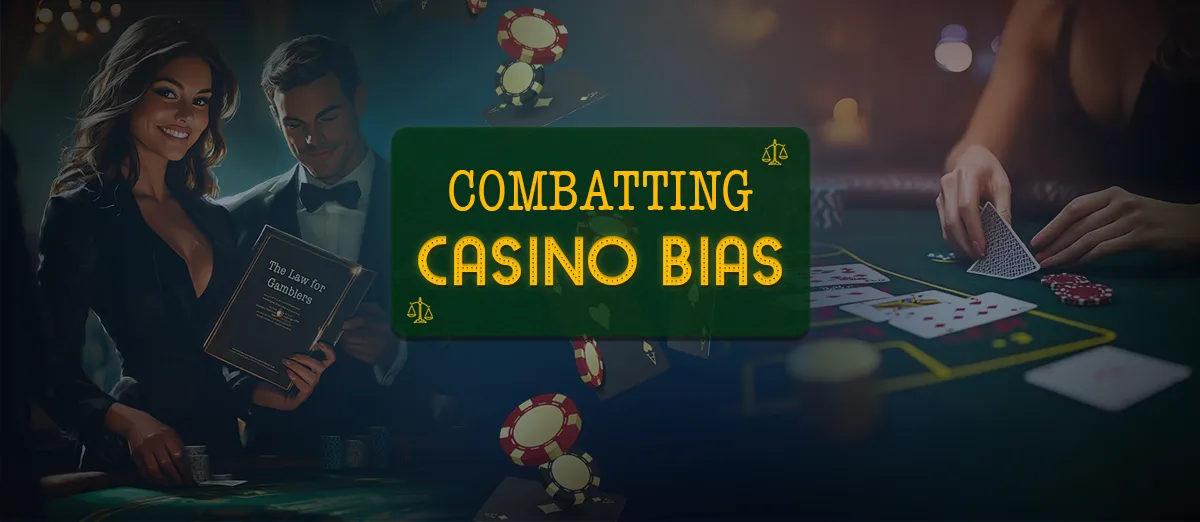R. Paul Wilson On: Protecting Yourself from Casino Bias

Gambling inherently involves a degree of risk, tempered by a player’s skill and strategy, yet there is always the looming threat of deception, skewed odds, or unfair practices—even under the best circumstances. Throughout the history of gaming, there are numerous instances of casinos shortchanging players or even outright cheating.
However, in modern corporate environments, laws are purportedly in place to protect all parties, ensuring advertised odds are honored and preventing unfair practices on either side of the tables. Yet, experience has shown that the law often hesitates to back players when the house might be at fault.
Let's take a brief interlude from our discussions on advantage play, cheating, and outright deception to explore an important aspect of gambling that could become a costly disadvantage should we suspect the rules have been unfairly bent or broken against us.
The Bias against Gamblers in the World of Consumer Rights
I’ve mentioned before that during my time as a television personality uncovering scams on "The Real Hustle," I found myself in a meeting with a senior BBC producer and presenter, discussing potential segments for their flagship consumer protection show, "Watchdog." I suggested a piece on Three Card Monte, which had recently reappeared in London. I believed it would vividly demonstrate how and why con game’s function.
The response was an immediate dismissal, followed by the view that those who gamble money on the streets are foolish and deserve their losses. This attitude extended to gamblers and the iGaming industry, implying that people who play games like blackjack or roulette somehow deserve to be cheated, or more precisely, are not entitled to the same protections as those booking a holiday or purchasing a car.
I was appalled by this dismissive attitude, but mostly disappointed that this supposed champion of consumers’ rights seemed to discriminate against legitimate gamblers simply because she couldn't identify with their choices on spending time and money. Despite several attempts to open a dialogue, the door remained firmly shut, and my interest in participating in her show swiftly evaporated. I came to realize that her perspective was not an anomaly but rather reflected a broader sentiment that pervaded the BBC, and, even more disheartening, mirrored the attitudes of the general public and the politicians who claim to represent them.
Gambling often suffers from a negative perception among those who never engage in it, frequently associated with illegal or immoral activities and summed up by the attitude “you get what you deserve,” whether you lose by fair means or foul. This perspective is not universal, but it is prevalent enough that even when the letter of the law appears to protect players, its interpretation can be skewed or distorted by those entrusted to enforce it.
When the Odds Are Stacked
A notable example in the United Kingdom is the case of Phil Ivey, who unsuccessfully tried to prove he had been treated unfairly by Crockfords Casino. The casino withheld his baccarat winnings, alleging he had cheated, though he had merely utilized an inherent flaw in their cards and played within pre-agreed rules to gain an advantage. Nonetheless, the UK legal system seemed biased in favor of the casino. Despite extensive expert advice supporting Ivey, the court's rigid interpretation led to a ruling that while Ivey might not have believed he was cheating, he had not adhered to the “spirit of the game.”
This reality urges us to think carefully about our choice of gaming locations and the protections available should we encounter issues or discover we might have been mistreated by a casino. While Nevada has had its share of problems, gaming in Las Vegas and beyond is generally well-regulated and monitored by authorities. These authorities ensure that casinos adhere to their own rules and local laws, and maintain a duty of care to players and guests within their establishments.
Certainly, there are numerous instances where this has not been the case, and it is reasonable to assume that billion-dollar properties possess more legal and political clout within the state than the average player. Despite these considerations, it remains a relatively safe place to risk your money and serves as a useful benchmark for comparing other gaming scenarios.
When playing overseas, it’s wise to evaluate local laws and protections before placing a single bet. Researching past events or cases where players encountered conflicts with casinos can help determine if there are any reputational concerns or if you would have recourse in the event of an issue. Monte Carlo, Madrid, Macau—what local challenges could influence you’re playing decisions and how much you choose to gamble? Now, apply that same scrutiny to online casinos and ask yourself: do you know where your preferred casino sites are headquartered?
Role of Online Casino Jurisdictions in Player Protection
Most online casinos are based in jurisdictions with favorable legal environments for online gambling, often due to more permissive regulations and lower tax rates. Some of the most popular jurisdictions for hosting online casinos include:
1. MALTA - The Malta Gaming Authority provides one of the most respected licenses in the online gambling industry. Malta is a popular choice due to its comprehensive regulatory framework and EU membership.
2. GIBRALTAR - Known for its stringent regulations and robust licensing standards, Gibraltar is a preferred base for many online gaming companies, especially those targeting European markets.
3. ISLE OF MAN - This jurisdiction offers attractive conditions for gaming companies, including tax incentives, strong regulatory oversight, and a well-established gambling infrastructure.
4. CURACAO - Offering one of the quickest and least expensive paths to obtaining a gaming license, Curacao is another popular choice for online casinos, although its regulatory oversight is sometimes considered less stringent than other jurisdictions.
5. UNITED KINGDOM - The UK Gambling Commission licenses and regulates online casinos operating within or targeting players in the United Kingdom, known for its strict standards and focus on player protection.
6. KAHNAWAKE - Located in Canada, the Kahnawake Gaming Commission is one of the oldest gaming regulatory bodies and licenses many online casinos and poker rooms.
These jurisdictions mostly provide a regulatory framework that supports online gambling but also ensure a limited degree of protection for players through licensing requirements and oversight. However, it's crucial to conduct your own research to determine which jurisdiction offers the most protection for you as a player. As a UK resident, I might be inclined to favor sites based here, but given my experiences following various disputes between casinos and players, I might prefer to engage with sites based in Malta or Gibraltar.
Bottom Line
If I gambled as seriously as some of my friends, I’d heed their advice to diversify by playing across multiple locations and routinely withdrawing money from player accounts once it reached a certain threshold. As one professional advised me: these platforms are not banks, and if they go under, your funds are at risk unless local laws favor the player, which is only truly tested when things go wrong.
It’s unfortunate that gamblers' interests are often overlooked or trivialized in public discourse, and while we can work to change this over time, in the present, we can minimize our risk through increased awareness. If ever drawn into a legal issue, proceed with caution and ensure that your representatives are thoroughly aligned with your interests.





Review this Blog
Leave a Comment
User Comments
comments for R. Paul Wilson On: Protecting Yourself from Casino Bias